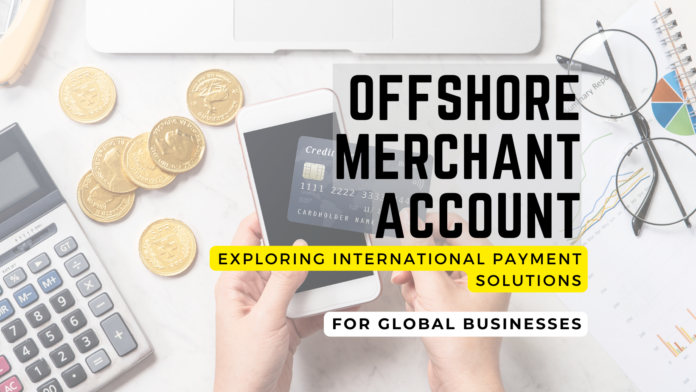In today’s interconnected global economy, businesses face increasing demands for secure and efficient payment processing solutions. An offshore merchant account offers a viable option for companies seeking to expand their reach and accept payments from customers worldwide. This extensive blog aims to provide a comprehensive guide to offshore merchant accounts, exploring their benefits, considerations, and implementation for businesses operating on an international scale. From understanding the concept of offshore accounts to navigating regulatory requirements and optimizing payment processing, we will delve into all aspects of offshore merchant accounts to help businesses make informed decisions about their global payment strategies.
Understanding Offshore Merchant Accounts
An offshore merchant account is a payment processing solution allowing businesses to accept payments from customers outside their domestic market. Unlike domestic merchant accounts, which are tied to a specific country, offshore accounts provide the flexibility to transact in multiple currencies and expand the customer base globally. Offshore merchant accounts often offer advantages such as lower processing fees, enhanced security features, and the ability to tap into international markets with different payment preferences.
Advantages of Offshore Merchant Accounts
Offshore merchant accounts offer several key advantages for businesses operating globally. Firstly, they enable businesses to accept payments from customers worldwide, opening up new markets and expanding revenue opportunities. Additionally, offshore accounts diversify payment processing, reducing reliance on a single domestic market. Enhanced security measures and fraud prevention tools often come with offshore accounts, protecting businesses from unauthorized transactions. Moreover, processing payments in different currencies facilitates seamless cross-border transactions and simplifies foreign exchange management.
Considerations for Offshore Merchant Accounts
Businesses must carefully consider various factors before setting up an offshore merchant account. Legal and regulatory requirements differ across jurisdictions, so understanding the compliance obligations and potential risks associated with specific offshore locations is crucial. Evaluating the reputation and stability of the chosen offshore jurisdiction is important for long-term business continuity. Comparing processing fees and rates from different providers ensures cost-effectiveness. Tax implications and reporting requirements must be thoroughly understood to maintain compliance with local tax authorities. Finally, assessing the customer support and service levels the payment service provider provides is essential for a smooth payment processing experience.
Setting Up an Offshore Merchant Account
Setting up an offshore merchant account involves a structured process. Businesses should first identify their specific needs and objectives, such as target markets, currencies, and transaction volumes. Selecting the right offshore jurisdiction requires consideration of factors such as legal framework, financial stability, and reputation. Choosing a reliable payment service provider experienced in offshore accounts is crucial. The application process involves submitting documentation related to the business, its ownership structure, and financial history. Compliance and due diligence procedures ensure adherence to legal and regulatory requirements.
Payment Processing and Security
Payment processing and security are vital components of offshore merchant accounts. Integrating a payment gateway allows businesses to process transactions online securely. Robust data encryption and secure transmission protocols safeguard sensitive customer information. Fraud detection and prevention measures, such as real-time transaction monitoring and velocity checks, help mitigate the risk of fraudulent activities. Effective chargeback management and dispute resolution procedures are essential for resolving payment-related conflicts. Compliance with Payment Card Industry Data Security Standards (PCI DSS) ensures adherence to industry best practices for data protection.
Currency Conversion and Forex Management
Offshore merchant accounts enable businesses to process payments in multiple currencies, necessitating effective currency conversion and foreign exchange (Forex) management. Multi-currency processing provides convenience to customers and can attract international buyers. Assessing different foreign exchange options and considering factors such as exchange rates and fees helps optimize Forex management. Mitigating currency risk and volatility through hedging strategies protects businesses from unfavorable exchange rate fluctuations. Businesses can achieve cost savings by leveraging Forex solutions that offer competitive rates and transparent pricing.
Managing Regulatory Compliance
Operating offshore requires diligent management of regulatory compliance obligations. Know Your Customer (KYC) procedures ensure the identification and verification of customers to prevent fraud and money laundering. Anti-Money Laundering (AML) and Counter Financing of Terrorism (CFT) compliance measures are necessary to adhere to international standards. Sanctions and embargoes must be strictly followed to avoid legal ramifications. Compliance with data privacy and protection laws safeguards customer data. Ongoing compliance monitoring and reporting mechanisms are crucial to maintain regulatory compliance and avoid potential penalties.
Mitigating Risks and Ensuring Business Continuity
Mitigating risks and ensuring business continuity is paramount when utilizing offshore merchant accounts. Implementing backup and redundancy measures, such as redundant servers and data backups, helps maintain uninterrupted payment processing operations. Disaster recovery plans outline procedures to be followed during system failures or natural disasters. Establishing contingency funds and reserves provides financial stability in uncertain times. Monitoring transactions and implementing fraud detection tools help identify and mitigate potential risks. Building strong relationships with payment service providers and maintaining open communication supports seamless business operations.
Selecting the Right Offshore Payment Service Provider
Choosing the right offshore payment service provider is essential for a successful offshore merchant account setup. Reputation and industry expertise ensure reliability and trustworthiness. A comprehensive range of services and flexibility allows businesses to tailor payment processing solutions to their specific needs. Competitive pricing and a transparent fee structure contribute to cost-effectiveness. Robust technology and security measures safeguard against cyber threats and protect sensitive data. Quality customer support and dedicated account management help address any issues promptly and ensure a smooth payment processing experience.
Case Studies and Success Stories
Examining real-world case studies and success stories provides valuable insights into businesses that effectively leverage offshore merchant accounts. These examples offer lessons learned, best practices, and strategies for growth. Analyzing the success factors and strategies these businesses employ can guide others in implementing their own offshore merchant accounts, unlocking the full potential of international payment processing, and expanding their global footprint.
Conclusion:
Offshore merchant accounts offer businesses a gateway to global payment acceptance, facilitating expansion into new markets and increasing revenue streams. Businesses can optimize their international payment processing operations by understanding the intricacies of offshore accounts, considering the right jurisdiction, complying with legal and regulatory requirements, and implementing robust security measures. With careful planning and the right payment service provider, businesses can capitalize on the advantages of offshore merchant accounts to drive growth, improve customer experiences, and achieve success in the global marketplace.



